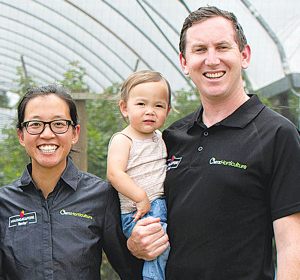The first hour on an orchard is more important for a worker’s employment prospects than anything in their life previously, says successful Whangarei grower Patrick Malley.
His family hydroponics berry and kiwifruit business, Maungatapere Berries, believes in giving people a chance.
Northland has massive potential in horticulture to boost the region’s economic base and employment, Malley told Rural News.
To provide job opportunities to long-term unemployed people can be a struggle, he says. There’s hard work involved and you have successes and failures.
“But we find there are a couple of key things: respecting people regardless of what their history is, and an employee’s history starts and stops at the front gate.
“That means that in the first hour someone is on our orchard, their attitude and their application to work are more important to us than their previous years’ job history and any of the challenges they might face in their lives.
“So having that level of respect for who they are and giving them opportunities to succeed rather than continually penalising them gives them the opportunity to do well.”
Another aspect of respect is having a reasonable contract. Rather than casual, weather dependent and on-call seven days, they instead provide workers 40 hours of work, rostered in advance over the work week.
“We say ‘come rain, hail or shine there will be work ready for you when you turn up for work’. That gives them a lot of confidence and surety.
“When people know they are likely to have enough money to put food on the table it takes away the pressures that affect their lives and enables them to focus on work.
“Then you can start building on the culture, the attitudes and the skills you want after that.”
Maungatapere Berries is tipped to become a model both for horticulture and for employment opportunities under a $2.37 million Provincial Growth Fund (PGF) partnership.
The PGF business loan is targeted to create the first centre for growing excellence in the New Zealand hydroponics horticulture industry.
“We have 45 fulltime staff and 180 casual for nine months of the year,” he told Rural News.
The PGF partnership will enable Maungatapere Berries to double its fulltime workforce over the next five to eight years and to develop the first phase of a high-tech education, training and employment operation, as part of Maungatapere Berries’ 20ha hydroponic orchard expansion.
NZ’s next fruit and vege bowl?
Northland has massive untapped potential in horticulture, says Patrick Malley.
“One of the greatest things about horticulture careers is you can start your training and learning on the job,” he said.
“You don’t need to get a degree, even though there is a huge amount of knowledge and experience required to be good at it. You can start from day dot, you can get a job and start getting paid. You can earn and learn at the same time.”
Northland has a lot of unemployment.
“Generally speaking those people actually prefer to work with their hands than sit in front of a desk. And one of the great values of horticulture is you can see the results of your work at the end of the day,” Malley told Rural News.
He points out that dairy or sheep and beef have a low level of fulltime employment per hectare, whereas avocados need 0.5 employees per hectare and kiwifruit closer to one employee per hectare.
“Hydroponics provides closer to eight fulltime equivalent jobs per hectare. When you look at those numbers and you look at return on investment per hectare it is no wonder people are turning land that maybe not suitable for different types of agriculture into high value horticulture,” he says.
“Horticulture in general – whether it be traditional or hydroponics – is there permanently and because you are growing plants that require a healthy environment sustainability is at the core of what you do.











